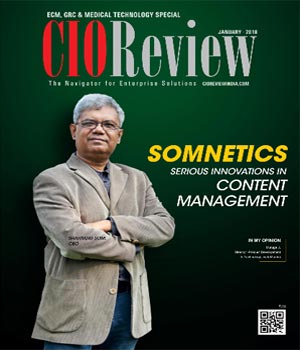
The Use of Technology in the Field of Clinical Research & Its Importance
Dr. Saleem Mohammed, CEO & Co-Founder, XCODE Life Sciences | Thursday, 16 June 2016, 04:56 IST
 Technology is an unalienable aspect of our lives. Looking back, it has contributed to enormous progress in clinical research and healthcare from early diagnosis to lifelong rehabilitation. Some notable examples of technology driven research incorporated into routine healthcare include - CT scanning and MRI imaging, radiation therapies, stenting procedures for coronary heart disease and many more. One of the most talked about technologies of 2014 with a potential to influence health of every individual and radically change the health of the nation is Genomic Technology. The image on the right from the National Institutes of Health, U.S. illustrates how solving technical challenges has reduced the cost of genome sequencing over time. In a span of 6 years, the cost of sequencing a genome has decreased a thousand fold outpacing exponential growth rates. Indeed, no other field has seen such drastic progress in the last 10 years than genomics.
Technology is an unalienable aspect of our lives. Looking back, it has contributed to enormous progress in clinical research and healthcare from early diagnosis to lifelong rehabilitation. Some notable examples of technology driven research incorporated into routine healthcare include - CT scanning and MRI imaging, radiation therapies, stenting procedures for coronary heart disease and many more. One of the most talked about technologies of 2014 with a potential to influence health of every individual and radically change the health of the nation is Genomic Technology. The image on the right from the National Institutes of Health, U.S. illustrates how solving technical challenges has reduced the cost of genome sequencing over time. In a span of 6 years, the cost of sequencing a genome has decreased a thousand fold outpacing exponential growth rates. Indeed, no other field has seen such drastic progress in the last 10 years than genomics.
Genomics in the Laboratory
The Human Genome project, completed in 2001, produced a complete sequence of the human genome and a gold mine of data. This was one of the first steps to include large scale DNA sequence data in clinical research projects, and aided better understanding of the underlying causes of many diseases that were not well understood. Direct implications of genomics in clinical research have now progressed beyond genetic diseases into providing a remarkable tool to better understand cancer, neurodegeneration and infectious diseases among others.
Molecular profiling of several human cancers has already been achieved. This field of cancer biology has now moved on to clinical trials matching the type of cancer to a drug that is most effective and safe to combat and kill that tumor. Similarly, in case of infectious diseases, evolving field of full genome profiling of invading microorganisms opens up a host of new therapeutic targets including effective vaccinations and even ways of preventing disease epidemics.
Our understanding of cross fertilization between environment and genes, the science called Epigenetics, and how the knowledge of this interaction could be used positively for chronic disease prevention is beginning to emerge; nevertheless, the future is very bright for sure.
Genomics in the Clinic
These and related advances will, in due course, lead to much more improved disease risk assessment, rapid and more accurate diagnosis, and more importantly targeted therapy plus treatment plans – a truly personalized approach in healthcare. In fact, knowledge about individual genetic variations is already being implemented in the clinic allowing physicians to better choose treatment options. In 2011, for example, with rapid DNA sequencing doctors identified a genetic condition in an infant girl that prevented her from growing properly. This condition however could be treated through tailored nutrition programs. Rapid sequencing allowed the doctors to immediately define her course of treatment, an event that could have taken months or years without this technology with the medical team ruling out one condition after another.
A more established use of genomics in personalized medicine is in the field of pharmacogenomics, moving away from the “one drug fits all” concept to the “right drug for the right person” approach. A clear example of this is the blood thinner drug Clopidogrel, a widely prescribed drug to prevent blood clotting in patients with heart disease. A certain percentage of the population has genetic variations that prevent their bodies from experiencing the full effects of the drug. This poses a risk in patients who have had stents surgically implanted in to improve blood flow in blocked arteries. If Clopidogrel does not work as well in these patients, they face a much higher chance of the stent failing to function properly due to a blood clot, leading to a potentially fatal heart attack. Gene sequencing in this case, allows a physician to personalize treatment for patients depending upon their genetic makeup. Patients in whom Clopidogrel does not work well can have their doses altered or switched to a different drug. Similarly, for many types of cancers also, treatment is now personalized with significant impact on survival and enhanced quality of life.
Whilst technological advancement is rapidly helping us cross the two major hurdles of cost and time taken for gene sequencing, there are still some outstanding issues that need attention for translational investigators. These relate to the computational complexities of analyzing the vast data generated and also the ethical, legal and social issues surrounding genomic sequencing. It is noteworthy that pari passu, advances are also made on these domains. This area of research is no longer the sole ownership of major academic institutions and the “big Pharma companies” in the U.S. and the west but is also within the reach of focused commercial enthusiasts in India. They should be supported to lead the scene for our country.
The words of the 19th century American Architect Daniel Burnham, “Make no little plans; they have no magic to stir men’s blood and probably themselves will not be realized. Make big plans; aim high in hope and work” will be conspicuous in genomic research and personalized medicine during the next decade.
CIO Viewpoint
By Aliasgar Bohari, Director IT, ZULEKHA HOSPITAL
Focus on the People Aspect will take the...
By Sanjeev Jain, VP of Information Technology, Integreon
Cloud Computing for Affordable Medicines
By Manoj Shah, VP IT, Amneal Pharmaceuticals
CXO Insights
The IoT Revolution in IVD Industry
By YS Prabhakar CEO, Transasia Bio-Medicals
When the Internet of Things met Analytics
By Salil Godika, Chief Strategy & Marketing Officer, Happiest Minds Technologies
The Use of Technology in the Field of Clinical...







